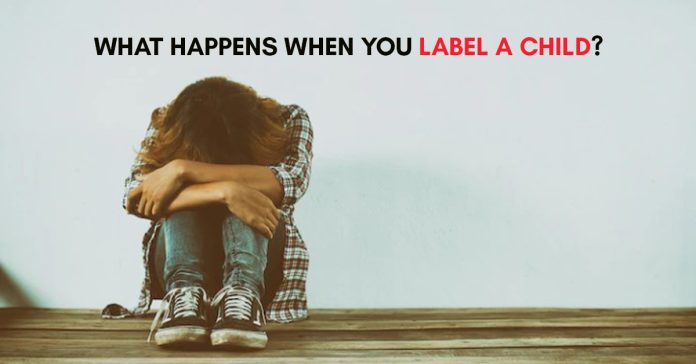Labelling a child as “you are–” has huge impact on the cognitive development and the perception of the self of a child.
What happens when you label a child?

A child’s self is developed by the influences of the environment (parents, siblings, grandparents, caretakers) in which he or she grows, others (friends, relatives, neighbors) and the perception about himself or herself.
Perception about the self depends on the cognitive development of a child. Cognitive skills of a normal child generally develop from the age of 1.5 years. Cognitive skills include Memory, Learning, Thinking, Attention, Reasoning.

See the above picture. A baby elephant is tied with a chain. At younger age, the elephant tries to run but cannot as pulling the chain hurts its leg. It grows with the same belief that it cannot run and wants to avoid the pain. It stays in the chain all the life.
The label attached to a child is like a chain to the elephant.
“You are a liar”
“You are lazy”
“You are arrogant”
“You are stubborn” ….so on
Such labels reiterate the child to stay with the label as the child learns to get things done with the label. The child wants to avoid doing things different from the label attached.
For instance, Raju has 2 daughters named Rani (3 years old), Vani (2 years old). When both girls are fighting for a teddy, Raju tries to resolve the fight by convincing Vani to give teddy to Rani as she is stubborn. Rani learnt that being stubborn is a skill to get what she wants.
What happens next?
What do you think, grown up Elephant cannot break the chains?
Yes, it can but do not try. It survives with the same belief— “To avoid pain, better to stay in the chains.”
The same happens to Rani. She grows with the belief that, being stubborn is her survival skill. Once she is out of her home, she faces criticism, problems from friends, later with colleagues, spouse, and her own kids if she still perceives that her stubbornness helps her to deal day to day issues.
ALOS READ: Suicide is a serious Public Health issue in India, can we prevent suicides?
Is there any other alternative to labelling?
Imagine the life of wild baby elephant with the chained one. The wild baby feels safe with its mother, explores the forest and itself. It is aware of its strength. After it is grown older enough, chain looks small for its strength.
Similarly, if the parents instead of labelling the child as such, they can try to correct the present behavior. Is it possible for Rani’s father to interfere and explain, “Rani you are behaving tough with your sister. Is it possible to take turns and play with the teddy?” Some kids agree and such questions help children to come up with their own solutions.
What if Rani does not agree?
Throw another question towards her so that she herself comes up with a solution. Say for example, asking Rani, “Don’t you think your sister deserves a chance to play with the teddy?”
OR
“What do you think your sister would be feeling when she does not get any chance to play with the teddy?”
Such type of questions makes children to explore themselves and their surroundings and to build their selves.


